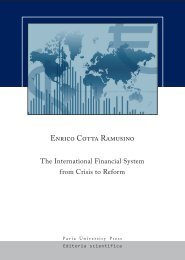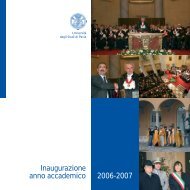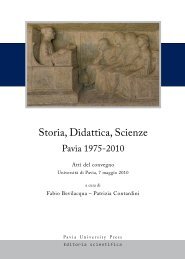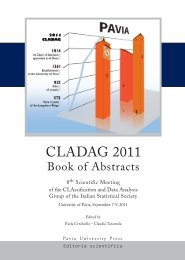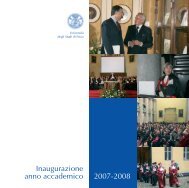The Palestinian Economy. Theoretical and Practical Challenges
The Palestinian Economy. Theoretical and Practical Challenges
The Palestinian Economy. Theoretical and Practical Challenges
You also want an ePaper? Increase the reach of your titles
YUMPU automatically turns print PDFs into web optimized ePapers that Google loves.
Academic Partners<br />
University of Pavia – University of Siena – Bethlehem University – An-Najah National University<br />
Istituto Universitario di Studi Superiori di Pavia (IUSS) – Bir Zeit University<br />
In collaboration with<br />
Fondo per gli Investimenti della Ricerca di Base (FIRB) – Ministero dell’Istruzione,<br />
dell’Università e della Ricerca (MIUR) – Internalization Project II04B0A748<br />
Cooperation <strong>and</strong> Development Network of Pavia<br />
It is well-known that <strong>Palestinian</strong> growth <strong>and</strong> development have been blocked by what<br />
happened as a consequence of the Second Intifada <strong>and</strong> 2006 Hamas electoral victory,<br />
namely the tough restrictions on both people <strong>and</strong> goods movements. However, there is<br />
much which remains to be understood.<br />
In this different scenario, is the Paris Protocol the good framework to restart some process<br />
of <strong>Palestinian</strong> development? Provided that trade relations with Israel are inevitably less<br />
flourishing than they were before 2000, is a policy of unconditional trade openness<br />
towards the rest of the world the best response? What are the concrete constraints<br />
preventing those <strong>Palestinian</strong> entrepreneurs who could make investments from doing so?<br />
And what are the social <strong>and</strong> fiscal implications associated with the last, tremendously<br />
complicated years? Who is suffering the most? <strong>The</strong>se are the issues this book tries to<br />
shed some light on. <strong>The</strong> last ten years dramatically changed the course of <strong>Palestinian</strong><br />
development, <strong>and</strong> economists <strong>and</strong> other social scientists may use this book as a tool to<br />
start thinking about the challenge of giving a chance to a people who strongly deserve it.<br />
Academic Partners<br />
University of Pavia – University of Siena – Bethlehem University – An-Najah National University<br />
University Institute for Advanced Studies (IUSS) – Bir Zeit University<br />
In collaboration with<br />
FIRB (Fondo per gli Investimenti della Ricerca di Base) – MIUR Italian Ministry of<br />
Education, University <strong>and</strong> Research (Internalization Project II04B0A748)<br />
Cooperation <strong>and</strong> Development Network, Pavia<br />
Texts published by Pavia University Press in the series “Editoria scientifica” have been peer-reviewed<br />
prior to acceptance by the Editorial Board. www.paviauniversitypress.it/scientifica<br />
€ 35,00 (Two Volume Set)<br />
ISBN 978-88-96764-11-4<br />
Edizioni dell’Università degli Studi di Pavia





